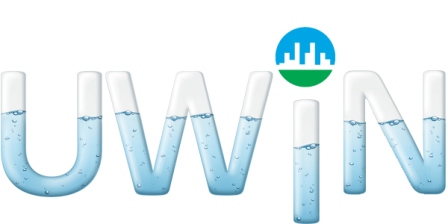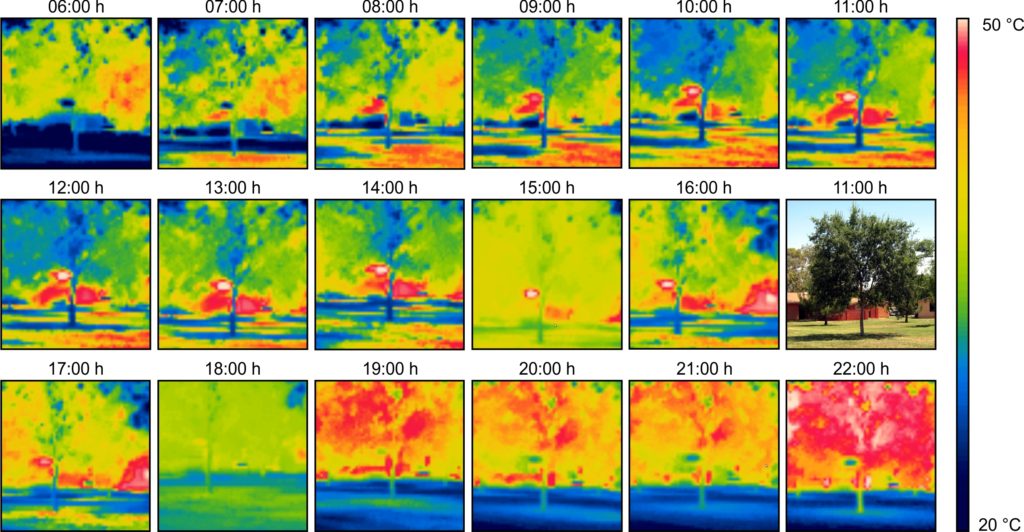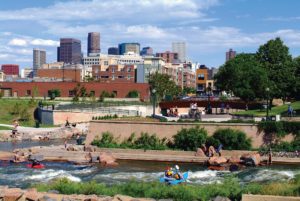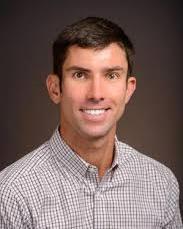Project A2-3 Assessing the thermal comfort implications of water-supported urban infrastructure at the human scale
David Hondula, PhD
Arizona State University
School of Geographical Sciences and Urban Planning
Reducing the adverse health impacts of heat exposure in cities has emerged as a shared priority among researchers, practitioners, and policymakers involved in many aspects of urban systems. Many of the strategies currently in place to reduce health risks related to heat exposure rely on water resources. UWIN project A2-3 investigates what will happen to the thermal comfort of urban residents, and risks of heat-related illness, in the face of changes to urban water systems driven by climatic variability and infrastructure modification.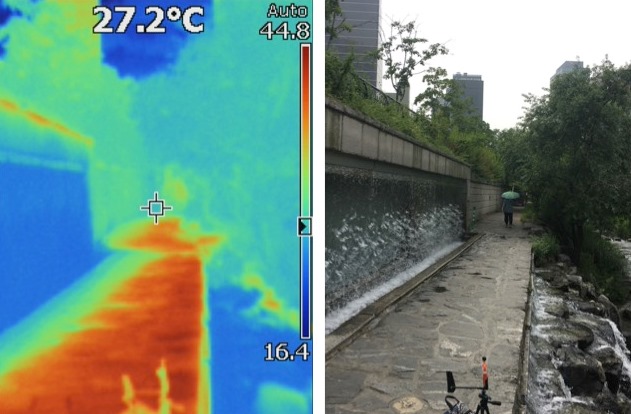
The first project objective is to assess the microclimatic conditions experienced by urban dwellers through the course of their daily lives, integrating indoor, outdoor, and transit-based exposures into metrics oriented around people rather than places. To make this assessment, we use large-scale time-activity data sets and direct observations, combined with high-resolution information about urban microclimates.
The second project objective is to quantify how changes in urban infrastructure, especially infrastructure elements supported by water, as well as changes in the urban climate, will impact the thermal comfort and risk of heat-related illness of urban residents. This objective will be achieved by combining time-activity and exposure information with projections from other UWIN projects. The project incorporates the perspectives of public health sector stakeholders gathered through a series of interviews across the UWIN study regions to ensure that research activities are aligned with public health priorities.
DATA
Project A2-3 will generate four different types of data outputs:
- Direct micrometeorological characterizations of environments utilized by urban dwellers;
- Information about time-activity patterns of urban residents;
- Modeled thermal stress of urban residents in current and modeled future conditions; and
- Transcripts and analysis of health sector perspectives on urban water systems and implications for heat-related illness
Project A2-3 is intended to benefit a wide range of decision-makers by providing more detailed information and a more comprehensive perspective regarding the implications of changes to the urban thermal environment and urban water systems for human health. Project results will be of interest to those considering changes to urban infrastructure that have the potential to directly or indirectly impact the thermal experience of urban residents.
For example, a common water-dependent strategy to improve thermal comfort in cities is the expansion of urban tree canopy and green space; cities across the globe are pursuing aggressive goals related to urban greening, planting new trees on public land, and incentivizing or encouraging tree planting on public land. Revitalization of surface water bodies in cities like lakes, ponds, streams, and canals is also occurring in many localities. Our project aims to support the decision-making process ahead of the deployment of these types of interventions by more holistically capturing the impacts to human health and well-being. Instead of focusing only on the environmental changes that will occur as a result of these projects, we also consider the extent to which these changes impact the thermal experience of the people that use the spaces in cities slated for change.
Related Materials
Books/Chapters
Harlan SL, Chakalian PM, Declet-Barreto J, Hondula DM, Jenerette DG. Pathways to Climate Justice in a Desert Metropolis. In: People and Climate Change: Vulnerability, Adaptation, and Social Justice. Lisa Reyes Mason and Jonathan Rigg, eds., published April 2019 (Chapter). DOI:10.1093/oso/9780190886455.003.0002
Journal Articles
Andrade R, Hondula DM, Larson KL, Lerman SB. Landscaping preferences influence neighborhood satisfaction and yard management decisions. Urban Forestry & Urban Greening. 2021 Apr 1;59:126983. https://doi.org/10.1016/j.ufug.2021.126983
Kuras ER, Bernhard MC, Calkins MM, Ebi KL, Hess JJ, Kintziger KW, Jagger MA, Middel A, Scott AA, Spector JT, Uejio CK, Vanos JK, Zaitchik BF, Gohlke JM, Hondula DM, 2016. Opportunities and Challenges for Personal Heat Exposure Research. DOI: 10.1289/EHP556 Environmental Health Perspectives.
Cao, Q., D. Yu, M. Georgescu, J. Wu (2016), Impacts of urbanization on summer climate in China: An assessment with coupled land-atmospheric modeling, J. Geophys. Res. Atmos, doi: 10.1002/2016JD025210, 121(18), 10,505-10,521. http://onlinelibrary.wiley.com/doi/10.1002/2016JD025210/full
Guardaro M, Messerschmidt M, Hondula DM, Grimm NB, Redman CL. Building community heat action plans story by story: A three neighborhood case study. Cities. 2020 Dec 1;107:102886. https://doi.org/10.1016/j.cities.2020.102886
Hondula, D. M., Middel, A., Vanos, J. K., Herdt, L., and Kaiser, A. (2017). Urban Water Infrastructure for Cooling: Case Studies from Humid and Arid Cities. Regions Magazine, 306(1), 20-23. https://doi.org/10.1080/13673882.2017.11878969
Hondula, D.M., R.C. Balling, R. Andrade, E.S. Krayenhoff, A. Middel, A. Urban, M. Georgescu, and D. Sailor (2017), Biometeorology for Cities. International Journal of Biometeorology (Special Issue/By Invitation Only), 61(Suppl 1): 59-69, https://doi.org/10.1007/s00484-017-1412-3.
Ibsen PC, Borowy D, Dell T, Greydanus H, Gupta N, Hondula DM, Meixner T, Santelmann MV, Shiflett SA, Sukop MC, Swan CM. Greater aridity increases the magnitude of urban nighttime vegetation-derived air cooling. Environmental Research Letters. 2021 Feb 15;16(3):034011. https://doi.org/10.1088/1748-9326/abdf8a
Vanos JK, Wright MK, Kaiser A, Middel A, Ambrose H, Hondula DM. Evaporative misters for urban cooling and comfort: effectiveness and motivations for use. International Journal of Biometeorology. 2020 Nov 26:1-3. https://doi.org/10.1007/s00484-020-02056-y
Updated: May 2021
David Hondula, PhD – Principal Investigator
Associate Professor
School of Geographical Sciences and Urban Planning
Arizona State University
Voice: (480) 965-4794
Email: david.hondula@asu.edu
David Hondula’s research examines the societal impacts of weather and climate with an emphasis on extreme weather and health. Recent projects include statistical analysis of health and environmental data sets to improve understanding of the impact of high temperatures on human morbidity and mortality, especially within urban areas. Hondula is also engaged in quantitative and qualitative field work to learn how individuals experience and cope with extreme heat in the Phoenix metropolitan area. Developing research considers how to facilitate effective governance and communication strategies for climate adaptation. These efforts are motivated by the overarching goal of reducing unnecessary weather-related illnesses and deaths through effective mitigation and intervention strategies.
Prior to joining ASU, Hondula received his Ph.D. in Environmental Sciences at the University of Virginia and was a visiting scholar at Umeå University in Umeå, Sweden and Queensland University of Technology in Brisbane, Australia. Hondula currently serves as a Director for the Association of American Geographers’ Climate Specialty Group, and is also member of the American Meteorological Society (AMS), International Association for Urban Climate (IAUC), International Society of Biometeorology (ISB), and International Society for Environmental Epidemiology (ISEE)
Senior Project Personnel
Ariane Middel – Research Scientist
Arizona State University
Email: middel@asu.edu
Jennifer Vanos – Research Scientist
University of California – San Diego
Email: jkvanos@as.ucsd.edu
Matei Georgescu – Research Scientist
Arizona State University
Email: georgescu@asu.edu
Sharon Harlan – Research Scientist
Northeastern University
Email: harlan@northeastern.edu
Elizabeth Mack – Research Scientist
Michigan State University
Email: emack@msu.edu
